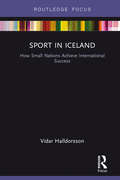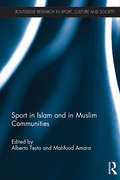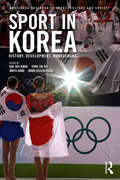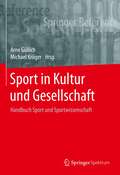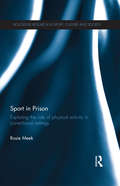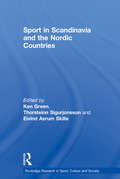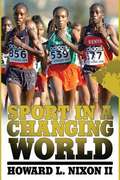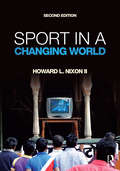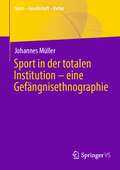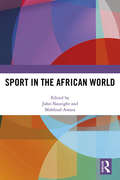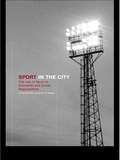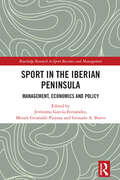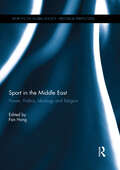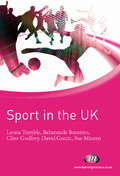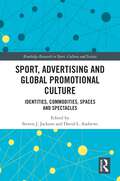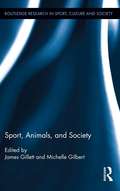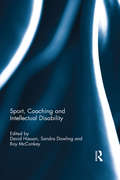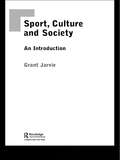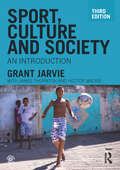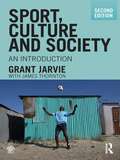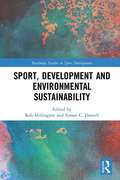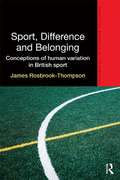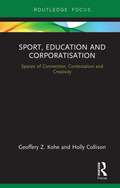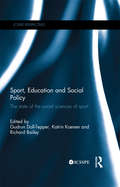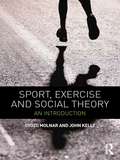- Table View
- List View
Sport in Iceland: How Small Nations Achieve International Success (Routledge Focus on Sport, Culture and Society)
by Vidar HalldorssonIceland is a tiny Nordic nation with a population of just 330,000 and no professional sports leagues, and yet its soccer, basketball and handball teams have all qualified for major international tournaments in recent years. This fascinating study argues that team sport success is culturally produced and that in order to understand collective achievement we have to consider the socio-cultural context. Based on unparalleled access to key personnel, including top coaches, athletes and administrators, the book explores Icelandic cultural capital as a factor in sporting success, from traditions of workmanship, competitive play and teamwork to international labour migration and knowledge transfer. The first book to focus specifically on the socio-cultural aspects of a small nation’s international sporting success, this is an original and illuminating contribution to the study of the sociology of sport. Sport in Iceland: How small nations achieve international success is fascinating reading for team sport enthusiasts, coaches, managers and organisers, as well as for any student or scholar with an interest in the sociology of sport, strategic sports development, sports policy or sports administration.
Sport in Islam and in Muslim Communities (Routledge Research in Sport, Culture and Society)
by Mahfoud Amara Alberto TestaAs Islam’s visibility in global society increases, Muslim populations grow, and Muslim countries compete to take up positions at the heart of global sport, the interplay between sport and Islam becomes ever more illuminating. Sport in Islam and in Muslim Communities is the first book to analyse this relationship through a pluralist lens, exploring the questions it raises about contemporary Islam, globalisation, and the challenges faced by (in particular young) Muslims in negotiating their place in global society. With contributions from Muslim and non-Muslim authors, the book approaches an array of contemporary issues, from the role of sport in gender, youth and political identities in Islam and Muslim societies to sport policy in Muslim countries, sport’s role among Muslim minorities and sport marketing’s relationship to Muslim cultures. Drawing on sociology, anthropology, political science, Islamic studies and sport studies, Sport in Islam and in Muslim Communities not only examines the significance of sport in Islam, but helps to draw wider conclusions on religious identity in sporting settings and the interplay between sport, gender, political ideology and consumer culture.
Sport in Korea: History, development, management (Routledge Research in Sport, Culture and Society)
by Dae Hee Kwak Yong Jae Ko Inkyu Kang Mark RosentraubKorea has become a powerful force in global sport, with South Korea finishing fifth in the medals table at London 2012 and hosting the Winter Olympics in 2018. This book brings together scholars from disciplines including sport history, sociology, journalism, economics, sport development, and sport management to explore the significance of sport in contemporary Korea. Presenting a variety of international perspectives, it plots the dynamic evolution of sport in Korea and envisions the possibilities for its future. Each chapter focuses on a key topic of current relevance, such as sport in the context of shifting relations between North and South Korea, or the role of sport in the expression of Korean nationalism. Arguing that individuals, institutions, businesses, and governments have actively leveraged or exploited sport to influence developments in various social, economic, cultural, and political arenas, this book sheds new light on the importance of sport as a catalyst for change in Korea. This is indispensable reading for any student or scholar with an interest in sport, history, and culture in Korea.
Sport in Kultur und Gesellschaft: Handbuch Sport und Sportwissenschaft
by Michael Krüger Dieter Hackfort Eike Emrich Freya Gassmann Christian PierdziochDieses Handbuch bietet einen kompletten Überblick über die zentralen Themen der Sozialwissenschaften im Sport. Es richtet sich an das breite Publikum der Fachleute, Lehrenden und Wissenschaftler*innen in Sport und Sportwissenschaft. Hier können Sie sich kompakt und kompetent über den Stand der Wissenschaft zur Kultur des Sports informieren. Das Handbuch ersetzt bisherige Lexika und Handbücher zum Sport. Die Texte sind verständlich formuliert und anschaulich aufbereitet. Die knapp 50 Kapitel in diesem Band geben Ihnen den aktuellsten wissenschaftlichen Stand über die ökonomischen, sozialen, kulturellen, politischen, rechtlichen, pädagogischen und psychologischen Zusammenhänge des Sports. Zudem erhalten Sie Hinweise auf die wichtigste nationale und internationale Forschungsliteratur. Die Herausgeber: Arne Güllich ist Professor für Sportwissenschaft und leitet das Fachgebiet Sportwissenschaft an der TU Kaiserslautern. Er forscht in den Bereichen Jugendsport, Talententwicklung, Training und Förderstrukturen. Güllich hat zuvor im Deutschen Olympischen Sportbund als Leiter der Stabsstelle Grundsatzfragen gearbeitet. Praxiserfahrungen hat er als Trainer vom Jugendbereich bis zu den Olympischen Spielen gesammelt. Michael Krüger ist Professor für Sportwissenschaft an der Westfälischen Wilhelms-Universität zu Münster. Seine Forschungsschwerpunkte liegen im Bereich der Sportpädagogik und -geschichte, der wissenschaftstheoretischen Grundlagen der Sportwissenschaft, der olympischen Geschichte und Erziehung sowie von ethischen und pädagogischen Fragen des Sports. Er ist Verfasser und Herausgeber zahlreicher wissenschaftlicher Arbeiten zum Sport sowie mehrerer Lehr- und Handbücher zur Sportwissenschaft und Sportpädagogik.
Sport in Prison: Exploring the Role of Physical Activity in Correctional Settings (Routledge Research in Sport, Culture and Society)
by Rosie MeekAlthough prison can present a critical opportunity to engage with offenders through interventions and programming, reoffending rates among those released from prison remain stubbornly high. Sport can be a means through which to engage with even the most challenging and complex individuals caught up in a cycle of offending and imprisonment, by offering an alternative means of excitement and risk taking to that gained through engaging in offending behaviour, or by providing an alternative social network and access to positive role models. This is the first book to explore the role of sport in prisons and its subsequent impact on rehabilitation and behavioural change. The book draws on research literature on the beneficial role of sport in community settings and on prison cultures and regimes, across disciplines including criminology, psychology, sociology and sport studies, as well as original qualitative and quantitative data gathered from research in prisons. It unpacks the meanings that prisoners and staff attach to sport participation and interventions in order to understand how to promote behavioural change through sport most effectively, while identifying and tackling the key emerging issues and challenges. Sport in Prison is essential reading for any advanced student, researcher, policy-maker or professional working in the criminal justice system with an interest in prisons, offending behaviour, rehabilitation, sport development, or the wider social significance of sport.
Sport in Scandinavia and the Nordic Countries (Routledge Research in Sport, Culture and Society)
by Ken Green Thorsteinn Sigurjónsson Eivind Åsrum SkilleThe Scandinavian and Nordic countries have some of the highest participation rates in sport and physical activity in the world and are therefore important case studies across a range of subjects, from sport policy to physical activity and health. This is the first book to bring together studies of all those countries in one volume, examining sport, physical activity and exercise, and exploring the factors behind such high levels of participation. Rich in empirical data, the book examines trends in sports participation, organisation and policy in each of the constituent countries, highlighting common themes and outcomes. This is a valuable resource for students, researchers and academics working in the fields of sport, physical education, leisure, sport policy, sport development, the sociology of sport, and physical activity and health.
Sport in a Changing World
by Howard L. NixonIn a stressful, turbulent world, sports can be an escape from reality. Yet sport actually mirrors the issues and problems of our world today, bearing the imprint of powerful forces of social change. This book offers a sociological perspective for seeing and understanding the place of sport in society and how it is affected by big business and by demographic, cultural, organizational, economic, political, and technological change. Nixon's main focus is "big-time" commercialized and corporate sport, from Little League Baseball, Inc. to youth club sports, high school and college athletics, and professional and Olympic sports. He writes vividly of the making and unmaking of heroes and celebrities. Throughout he shows how the combined influence of networks of major sports organizations, media corporations, and corporate sponsors is shaping sport around the world.
Sport in a Changing World
by Howard Nixon IIThis book shows how the dynamic interplay of a powerful "golden triangle" of sports, media, and business interests with social, cultural, economic, and political forces shapes sport in a changing world. This edition is a condensed and updated version of the first edition, with an emphasis on current social issues in sport. It also has more global content. The golden triangle concept is more developed and applied more extensively. Other key themes of the first edition—power, status, and inequality—are also more developed. New "Stop and Think Questions" have been added to challenge students to think about the meaning of what they have read. The book is now divided into five sections. The new sections highlight sociology and the sociology of sport; inequality and diversity; globalization and social deviance; major social contexts of sport, including the high school, college, and professional levels; and power, political economy, and global sports.
Sport in der totalen Institution – eine Gefängnisethnographie (Sport – Gesellschaft – Kultur)
by Johannes MüllerJustizvollzugsanstalten müssen Gefangenen die Möglichkeit anbieten, sich sportlich zu betätigen. Basierend auf mehrjähriger ethnographischer Forschung in einem Gefängnis untersucht das Buch die vielschichtigen Bedeutungen, die der Sport aus Sicht der Gefangenen besitzt. Die Befunde zeigen, dass sich Sport für einen Teil der männlichen Insassen als Bewältigungsstrategie zur Linderung der hafttypischen Belastungen erweist, indem er Freiheitsmomente birgt und Möglichkeiten eröffnet, gefängnistypischen Gefühlen von Angst, Einsamkeit, Langeweile und mentaler Niedergeschlagenheit zu begegnen. Darüber hinaus stellt der Sport ein probates Mittel zur Konstruktion bzw. Verteidigung von Männlichkeit, zur Selbstaufwertung und zur Positionierung in der sozialen Hierarchie unter den Gefangenen dar. Die Befunde zeigen weiterhin, dass speziell die Teilhabe an anstaltsorganisierten Sportangeboten voraussetzungsvoll ist und das besondere Gefängnissetting viele Inhaftierte von einer Sportteilhabe abhält.
Sport in the African World
by John Nauright Mahfoud AmaraSport has been a component of African cultural life for several hundred years. In today’s globalized world, Africans and Africa have become a vital part of the international sporting landscape. This is the first book to attempt to survey the historical, contemporary and geographical breadth of that landscape, drawing on multidisciplinary scholarship from around the world. To gain an understanding of sport in Africa and its contributions to the global sports world, one must first consider the ways in which sport itself is a terrain of conflict and represents another symbolic territory to conquer. Addressing key themes such as colonialism, globalization, migration, apartheid, politics and international relations, sports media and broadcasting, ethnobranding, sports tourism and the African diaspora in Europe and the United States, this collection of original scholarship offers a significant contribution to this burgeoning field of research. Sport in the African World is fascinating reading for all students and scholars with an interest in sport studies, sport history, African history or African culture.
Sport in the City: The Role of Sport in Economic and Social Regeneration
by Chris Gratton Ian P. HenryCities now seek to attract major sporting events and activities to re-image themselves, and frequently invest in community sports development to fund economic growth and regeneration. Including a range of case-studies from global (the Sydney Olympics) to local (urban school sports), this book looks closely at how sport has been used in contemporary cities across the world, and evaluates policies, strategies and managment.Five key areas are examined:* sport and urban economic regeneration* sports events: bidding* planning and organization* Urban Sports tourism* Sport and urban community development* Urban politics and sports policy.Sport in the City therefore represents an essential resource for urban policy makers and the sports policy community. It will be invaluable reading for sports studies students and urban geographers.
Sport in the Iberian Peninsula: Management, Economics and Policy (Routledge Research in Sport Business and Management)
by Gonzalo A. Bravo Jerónimo García-Fernández Moisés Grimaldi-PuyanaThis is the first book in English to offer an overview of the development of the sport industry in Spain and Portugal, examining the social, economic, cultural, and political impact sport has had in this region and on world sport more broadly. Drawing on sources in Spanish and Portuguese, the book presents important new perspectives and empirical material not previously available to English-speaking audiences. With a strong focus on management, development, economics, governance and law, set in a broader historical and socio-cultural context, the book explains the unique characteristics of the sport industry in the Iberian Peninsula. It takes a deep dive into Spanish and Portuguese football - in many ways the centre of gravity of Iberian sport – and into sport tourism, a hugely significant component of the broader economy of the region. The book also considers important emerging themes in Iberian sport, from the development of women’s sport to the global profile of Cristiano Ronaldo and Rafael Nadal, and considers the wider influence of Iberian sport across the wider Hispanic diaspora. This is fascinating and illuminating reading for anybody with an interest in sport business and management, global sporting cultures, international business, or Hispanic or Latin American studies.
Sport in the Middle East: Power, Politics, Ideology and Religion (Sport in the Global Society - Historical Perspectives)
by Fan HongThis collection provides interdisciplinary study of sport in the Middle East in the context of history, politics, policies, gender, religion, ideology and international relations. The chapters examine the role of the Pan-Arab Games in strengthening the bonds of Arab identity in Qatar, the contribution of sport to the building of nationhood and cultural image in Lebanon and Turkey, female involvement in the Olympic movement in Middle Eastern countries, how sport has facilitated the promotion of gender equality and how sport has served the social and cultural transformation of the Islamic world.Study of the role and functions of sport in the Middle East in its historical, political and cultural context is long overdue. Based on recent research conducted by prominent young scholars in this field, this collection will inspire and stimulate the future development of research in the Islamic world. This book was originally published as a special issue of The International Journal of the History of Sport.
Sport in the UK (Active Learning in Sport Series)
by Leona Trimble Clint Godfrey David Grecic Woobae Lee Susan MintenThis is a comprehensive introduction for HE students to the provision, organisation, and governance of sport in the UK. Supported by case study material, it introduces the reader to key government policies, and to the ways in which public, private and voluntary sectors provide sporting opportunities. The book focuses on issues of participation, employment, media coverage and commercialisation, and critically examines them in light of the key themes of equality and diversity. Pedagogical features – learning outcomes and learning activities – help students develop an active approach to the study of sport in the UK.
Sport, Advertising and Global Promotional Culture: Identities, Commodities, Spaces and Spectacles (Routledge Research in Sport, Culture and Society)
by David L. Andrews Steven J. JacksonThis book explores the intersection of contemporary sport, advertising, promotional culture and wider society.Arguing that advertising and promotional culture remain key driving forces in relation to social structures and systems that contribute to enduring patterns of economic and other forms of inequality, this book examines how sport and related areas of social life continue to be transformed by these forces. Presenting in‑depth international case studies covering topics such as Nike’s sign economies, the sports‑gambling‑media complex, sportswashing/greenwashing, radical politics in sport advertising, sport and corporate nationalism, and girls’ empowerment and transgender exclusion in sports, this book sheds critical new light on some of the most important themes in the study of global consumer culture in the emerging era of surveillance capitalism. Overall, this book examines sport advertising through the lens of the circuit of cultural commodification – including production, representation, consumption and regulation – in order to provide insights into the formation, complexities and contradictions of social identities, commodities and brands.This is fascinating reading for anybody with an interest in the sociology, culture and politics of sport, or cultural studies, media studies, and the wider politics and social significance of late‑stage capitalism.
Sport, Animals, and Society (Routledge Research in Sport, Culture and Society #31)
by James Gillett Michelle GilbertThis book advances current literature on the role and place of animals in sport and society. It explores different forms of sporting spaces, examines how figures of animals have been used to racialize the human athlete, and encourages the reader to think critically about animal ethics, animals in space, time and place, and the human-animal relationship. The chapters highlight persistent dichotomies in the use of and collaboration with animals for sport, and present strategies for moving forward in the study of interspecies relations.
Sport, Coaching and Intellectual Disability
by David Hassan Sandra Dowling Roy McConkeyThere are more opportunities than ever before for young people with disabilities to participate in sport and adapted physical education. For example, there are more than 3.7 million athletes worldwide aligned to the Special Olympics organisation, with national associations active in more than 200 countries worldwide. Despite this rapid growth, all too often coaches and teachers lack adequate knowledge of the particular challenges faced by people with intellectual disabilities. The principal aim of this book is to improve the understanding and professional skills of coaches, teachers, practitioners and researchers, to promote awareness of successful programmes addressing the needs of such young people, and to challenge the prevailing myths and stereotypes surrounding their abilities. With contributions from leading researchers and practitioners around the world, this book is the first to explore in depth the topic of sport and intellectual disability from a coaching perspective. Including both theoretical discussion and empirical case-studies, the book covers a full range of contemporary issues and themes, including training and coaching, family support, perceptions of disability, athlete motivation, positive sport experiences, motor development programmes, and social and cultural aspects of disability. Sport Coaching and Intellectual Disability is important reading for any student, researcher, coach, teacher, manager or policy maker with an interest in disability sport, physical education, coaching, or mainstream disability studies.
Sport, Culture and Society: An Introduction
by Grant JarvieThis exciting, accessible introduction to the field of Sports Studies is the most comprehensive guide yet to the relationships between sport, culture and society. Taking an international perspective, Sport, Culture and Society provides students with the insight they need to think critically about the nature of sport, and includes: a clear and comprehensive structure unrivalled coverage of the history, culture, media, sociology, politics and anthropology of sport coverage of core topics and emerging areas extensive original research and new case study material. The book offers a full range of features to help guide students and lecturers, including essay topics, seminar questions, key definitions, extracts from primary sources, extensive case studies, and guides to further reading. Sport, Culture and Society represents both an important course resource for students of sport and also sets a new agenda for the social scientific study of sport.
Sport, Culture and Society: An Introduction
by Grant JarvieWhat can sport do to produce social change in our world today? It is impossible to fully understand contemporary society and culture without acknowledging the importance of sport. Sport is part of our social and cultural fabric, possessing a commercial power that makes it a potent force in the world, for good and for bad. It has helped to start wars and promote international reconciliation, and governments around the world commit public resources to sport. Sport matters, but how should you make sense of what is going on in the world of sport today? Now in a fully revised, updated and expanded third edition, this critical, challenging and comprehensive textbook introduces the study of sport, culture and society. International in scope, it challenges us to reactivate an audacious spirit of activism through sport. Full of contemporary examples, it places sport at the heart of the analysis and introduces the reader to every core topic and emerging area in the study of sport and society, including: the history and politics of sport; sport, gender and sexuality; sport, disability and advocacy; sport, race and racism; sport, violence and crime; sport and health; sport, globalisation and democracy; sport, media and cultural relations; sport and the environment; sporting cities and mega-events; sport, poverty and development. Each chapter includes a wealth of useful features, including Sport in Focus case studies, chapter summaries, guides to further reading, revision questions, practical projects, definitions of key concepts and weblinks. Additional teaching and learning resources – including a testbank, resource list and glossary – are available on a companion website. Sport, Culture and Society is the most broad-ranging, in-depth and thoughtful introduction to the sociocultural analysis of sport currently available and sets a new agenda for the discipline. It is essential reading for all students with an interest in sport.
Sport, Culture and Society: An Introduction, second edition
by Grant JarvieIt is impossible to fully understand contemporary society and culture without acknowledging the place of sport. Sport is part of our social and cultural fabric, possessing a social and commercial power that makes it a potent force in the world, for good and for bad. Sport has helped to start wars and promote international reconciliation, while every government around the world commits public resources to sport because of its perceived benefits. From the bleachers to the boardroom, sport matters. Now available in a fully revised and updated new edition, this exciting, comprehensive and accessible textbook introduces the study of sport, culture and society. International in scope, the book explores the key social theories that shape our understanding of sport as a social phenomenon and critically examines many of the assumptions that underpin that understanding. Placing sport at the very heart of the analysis, and including vibrant sporting examples throughout, the book introduces the student to every core topic and emerging area in the study of sport and society, including: the history and politics of sport sport and globalization sport and the media sport, violence and crime sport, the body and health sport and the environment alternative sports and lifestyles sporting mega-events sport and development. Each chapter includes a wealth of useful features to assist the student, including chapter summaries, highlighted definitions of key terms, practical projects, revision questions, boxed case-studies and biographies, and guides to further reading, with additional teaching and learning resources available on a companion website. Sport, Culture and Society is the most broad-ranging and thoughtful introduction to the socio-cultural analysis of sport currently available and sets a new agenda for the discipline. It is essential reading for all students with an interest in sport. Visit the companion website at www. routledge. com/cw/jarvie.
Sport, Development and Environmental Sustainability (Routledge Studies in Sport Development)
by Simon C. Darnell Rob MillingtonThis is the first book to consider the intersections of sport, international development and environmental sustainability. It explores the tensions between sport’s potential contribution to the environment and its rather poor record to date. Bringing together a diverse group of scholars who approach the topic from various disciplinary and theoretical perspectives, the book provides both critical and optimistic perspectives on the place of sport in sustainable development. Chapters examine and question how and whether sport contributes to sustainable development on an international scale. Attention is also paid to the place and role of Indigenous knowledge in sustainable Sport for Development, particularly as an alternative to modernization and/or in support of reconciliation with Indigenous peoples. Sport, Development and Environmental Sustainability is important reading for academic researchers, students and policy-makers in the fields of kinesiology, sport studies, sport sociology, leisure studies, sport management, sport media, physical cultural studies, environmental studies and sustainability and international development studies.
Sport, Difference and Belonging: Conceptions of Human Variation in British Sport (Routledge Advances in Ethnography)
by James Rosbrook-ThompsonThis book combines historical and ethnographic components in examining the ideas about human variation subscribed to by coaches, commentators and sportspeople themselves. The book begins by interrogating the idea of the ‘impulsive’ black sportsman (and the ‘impulsive’ black male more generally), documenting how it came into being and gathered momentum throughout the course of British history. Drawing on the work of Paul Gilroy and Ian Hacking, the author then investigates whether such raciological ideas figure within the everyday behaviours of a group of young footballers. Presenting an original ethnographic study undertaken at Oldfield United, a semi-professional football club situated in London, he explores how raciological ideas (and other notions of human variation) shape the self-understandings of the club’s players and thereby influence the possibilities for action available to them. In conceptualising the sense of "feeling alien" experienced by club personnel – in relation to mainstream discourses of nationhood, to politics, to the basic functioning of the nation-state and, at bottom, to the qualifications and requirements of British citizenship – ‘Sport, Difference and Belonging’ challenges the ability of the cosmopolitan tradition to make sense of contemporary urban phenomena and seeks to develop the sociological concept of denizenship. This book will be of interest to academics and students in the fields of sociology and social policy, ‘race’ and ethnic studies, urban studies, the ethnographic method, and the sociology of sport. It may also appeal to politicians, policy makers and those working in the field of ‘race relations.’
Sport, Education and Corporatisation: Spaces of Connection, Contestation and Creativity (Routledge Focus on Sport, Culture and Society)
by Holly Collison Geoffery Z. KoheUsing an interdisciplinary approach, Sport, Education and Corporatisation offers an important critique of the intersection between sport organisations, commercial agendas and educational development. It reveals a discomforting interplay between sector stakeholders that has been normalised via discourses of civic ‘good’, social responsibility and community welfare. The book employs stakeholder theory, corporate social responsibility ideals, and holistic constructions of space to provide a framework to understand some of the latent and explicit complexities of sport sector connectivity. Interrogating the key contexts, issues and challenges that emerge from the Sport-Education-Corporate nexus and drawing upon evidence from international, national and local sport organisations, it argues for sustained and rigorous examination of the commercialisation of educational agendas and new directions for education-based corporate social responsibility within the sport industry. This is an invaluable resource for researchers working in the areas of sport management; sport development; sociology of sport; sport policy and politics; physical education; and the wider economics, organisational politics and business ethics fields. It is also a fascinating read for students within sport business management, sports studies, sport politics and physical education programmes.
Sport, Education and Social Policy: The state of the social sciences of sport (ICSSPE Perspectives)
by Richard Bailey Gudrun Doll-Tepper Katrin KoenenThis important study brings together world-leading researchers to reflect upon the state of the social scientific study of sport. Addressing three core themes in sport studies – equality, education and policy – the book looks back over the development of sport research in recent decades and offers new insights into future lines of enquiry. Presenting a unique collection of authoritative perspectives from some of the best-known scholars in the social scientific study of sport, the book engages with key contemporary issues such as gender stereotypes in physical education, ethnicity, inclusion and critical race theory, physical literacy, physical activity and health, and international sport governance. Its chapters address major topics such as the globalisation of physical activity initiatives and the involvement of the EU in developing sport policies, as well as shedding light on new areas of research such as the growing participation of Muslim women in sport. Sport, Education and Social Policy: The state of the social sciences of sport is fascinating reading for any researcher or advanced student working in sport studies, physical education or kinesiology.
Sport, Exercise and Social Theory: An Introduction
by John Kelly Gyozo MolnarWhy are sport and exercise important? What can the study of sport and exercise tell us about wider society? Who holds the power in creating contemporary sport and exercise discourses? It is impossible to properly understand the role that sport and exercise play in contemporary society without knowing a little social theory. It is social theory that provides the vocabulary for our study of society, that helps us ask the right critical questions and that encourages us to look for the (real) story behind sport and exercise. Sport, Exercise and Social Theory is a concise and engaging introduction to the key theories that underpin the study of sport, exercise and society, including feminism, post-modernism, (Neo-)Marxism and the sociological imagination. Using vivid examples and descriptions of sport-related events and exercise practices, the book explains why social theories are important as well as how to use them, giving students the tools to navigate with confidence through any course in the sociology of sport and exercise. This book shows how theory can be used to debunk many of our traditional assumptions about sport and exercise and how they can be a useful window through which to observe wider society. Designed to be used by students who have never studied sociology before, and including a whole chapter on the practical application of social theory to their own study, it provides training in critical thinking and helps students to develop intellectual skills which will serve them throughout their professional and personal lives.
